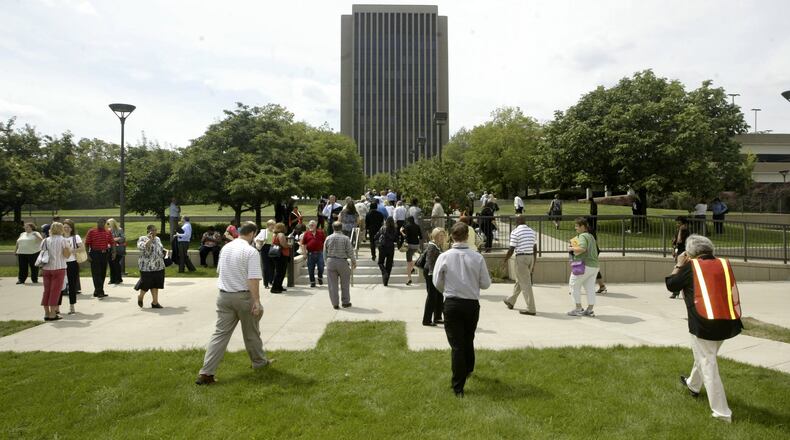RELATED: Sales tax increase an option to plug $9M budget loss
“That may sound like a lot of money. In a gross sense it is,” said Montgomery County Administrator Joe Tuss. “But when you look at the needs we have as a county … this sales tax increase is something that is going to allow us to continue to operate in an efficient and effective responsive fashion, invest in the community, and we won’t be back here five years from now asking for more.
A general fund education session for the public is scheduled for Monday at 5:30 p.m. at the main Dayton Metro Library’s Eichelberger Forum. If commissioners then agree to move forward, two public hearings required by state law, would be scheduled for June.
Tuss said about $4.6 million in operating efficiencies has also been identified and county employees — beginning with those not represented by a collective bargaining agreement — will begin paying more for their health insurance to help stabilize the general fund budget, which this year is $154.7 million. Health insurance costs would more than double for a majority of workers under the proposal and would rise even more for the highest paid employees.
RELATED: $9M shortfall: Montgomery County faces program cuts
Phil Parker, president and CEO of the Dayton Area Chamber of Commerce, has been a proponent of consolidating services to save money and wary of tax increases as a member of the county’s Five-Year Financial Advisory Committee. But like every other member of the group during a meeting Monday, Parker did not offer his blessing, but neither did he oppose the plan that includes some sacrifice by county departments and employees.
“I think the fact that you are moving forward on those in your public hearing will help you make your case to the public that you’re not just taxing, that you are trying to look for efficiencies along the way, too,” Parker said.
Without a sales tax increase, county workers would likely see across-the-board wage reductions and a host of discretionary programs would be on the chopping block, including arts programs and popular Economic Development/Government Equity (ED/GE) grants that help attract and expand businesses. All those options were presented by Tuss at earlier meetings of the Five-Year Financial Advisory Committee that heard more about the newest proposal on Monday.
MORE: Arcade could create 400+ jobs, grant application says
The additional revenue will also go toward other strategic community projects, improvements in the outdated justice and jail facilities and be put into programs to keep people out of the jail.
“One of the things we have to be able to do is talk about not just how to fill that gap – the $9 million – but why we are investing in our community and why we are going to continue to invest in our community,” said Montgomery County Commission president Debbie Lieberman.
It’s unclear whether the measure will gain the full support of the commission.
“At this point I just haven’t made my mind up yet,” said Montgomery County Commissioner Dan Foley. “And I don’t think it’s right to make my mind up, frankly, until we have time to let this sink in some in the community.”
Commissioners Judy Dodge and Lieberman also said it will be important to listen to the public, but are both generally supportive of the plan.
Dodge is hopeful there will be a good turnout at the education session and the public’s questions and concerns will be addressed.
Montgomery County has collected a retail sales tax of 1 percent since 1989. If an increase is approved by county commissioners, the cost per person in Montgomery County is estimated to be about $36 more a year for a total of $182.
MORE: Question of sales tax on online purchases goes to high court
Montgomery County residents — and those in 51 other Ohio counties — currently pay a total retail sales tax rate of 7.25 percent, of which 5.75 percent goes to the state.
The county’s 1 percent retail sales rate puts it currently in the lower quarter of Ohio’s 88 counties but a 0.50 percent Greater Dayton Regional Transit Authority tax skews the percentage upward. Many counties have higher sales tax, including Clark and Preble at 1.5 percent and Miami and Warren at 1.25 percent, while Greene collects 1 percent and Butler 0.75 percent.
The overall retail sales rate in Cuyahoga County, which has a 1 percent transit tax, is the highest in the state at 8 percent; a Montgomery County increase would make it the second highest county in the state.
General fund public education session
Monday, April 30
5:30 - 7 p.m.
Dayton Metro Library, Eichelberger Forum
215 E. Third Street, Dayton
By The Numbers
0.25 — percent sales tax would increase, if approved.
50 — percentage of general fund revenue that is sales tax.
$19.3M — amount the increase would generate annually.
$9M —revenue the county will lose from a tax no longer allowed by the state.
$154M — county's general fund budget this year.
Where sales taxes go for every $1,000 spent in Montgomery County
$57.50 — state of Ohio
$10 — Montgomery County
$5 — Greater Dayton Regional Transit Authority
About the Author

